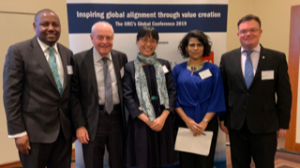
By Patrick Kabuya
Senior Governance Specialist, World Bank. IIRC and AIRC member

What could Africa learn from the 2019 International Integrated Reporting Conference (IIRC) hosted in London on May 16 -17, 2019. This is what I reflected on after participating and speaking in the inspiring conference attended by over 250 business, investor, accountancy and regulatory leaders. I identified four key lessons that the IRC of South Africa and particularly the Africa Integrated Reporting Council (an initiative of the World Bank and PAFA) can champion to accelerate Integrated Thinking and Reporting in Africa.
Firstly, Africa can learn from countries already implementing the reform in addition to South Africa. Integrated Reporting (IR) is gaining momentum across the globe. In 2018, 420 companies issued integrated reports in Japan, 30 major companies in India, and 60 top companies in Malaysia. Europe’s Non-Financial Reporting Directive is a game changer: almost 12,000 companies have prepared non-financial reports. In Brazil, all State-Owned Enterprises are required to produce integrated reports. The New Zealand government prepared its annual report using ‘the Wellbeing and Capitals Approach’, concepts of IR.
Secondly, African countries should increasingly incorporate integrated thinking and reporting in corporate governance codes and empower Board members to understand and apply the concept. The conference was informed of such developments in several countries. As a result, Boards should integrate in their meetings and business strategies long term value creation thinking and the three dimensions of sustainable development: economy, society and environment. I was pleased to note the increased uptake by companies reporting on climate related financial disclosures (TCFD): disclosures that should be considered by African companies.
Thirdly, African professional accountancy organizations (PAOs) should incrementally develop skills needed to conduct audits of integrated reports. It was acknowledged that a different set of skills will be required to meet the increasing demand for assurance of integrated reports and especially to apply the guidance being prepared by IAASB on Extended External Reporting Assurance, whose progress was presented at the Conference.
Fourthly, there is an opportunity for internal auditors in Africa to increase their role in the integrated reporting cycle. This would include: helping management to understand what IR is and its importance (champion role), provide guidance on processes and systems to collect data (advisory role), and provide assurance to the Board and management on the adequacy and adherence of governance processes of IR data collection processes (assurance role).
Finally, asked about my aspirations of global momentum during a panel session at the conference, I stated: I would like to see, at least three more African countries legally adopting integrated reporting by 2021 in addition to South Africa; more African PAOs, tertiary institutions and business schools including integrated thinking and reporting in their qualification and programs; and Africa playing a more global influential role in integrated thinking and reporting including actively contributing in future IIRC events as participants and speakers, and hosting IIRC in the region within the next three years. I invite you to contribute in achieving these aspirations.



